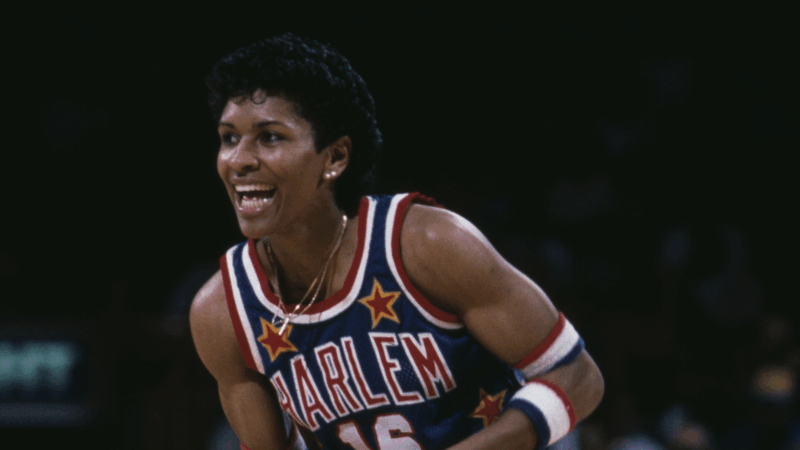40 years ago, a woman made Harlem Globetrotters history
In 1926 the Harlem Globetrotters basketball team was founded, more than 20 years before Black men were allowed on professional basketball teams. But this squad composed of only African American players gradually gained popularity in the basketball world.
When their founder, Abe Saperstein, died 40 years later, the team struggled to maintain that popularity. Over the next two decades the Harlem Globetrotters team was sold twice, and by 1984 the new owner was looking for ways to freshen up the performance. In 1985, the team put out a newspaper ad offering tryouts to women.
Of the 60 women that responded to the ad, only 20 moved on to the second round of tryouts, and one of the players at the top of the list was University of Kansas basketball star Lynette Woodard.
The Wichita, Kan., native told NPR that she started playing basketball with her brother and was inspired by her cousin, Harlem Globetrotter Hubert “Geese” Ausbie.
“I can remember when I was very young,” Woodard said, “him coming to our house and showing our family a lot of ball-handling tricks, and I was just so amazed … it’s been a dream to, you know, possibly play for the Harlem Globetrotters one day.”

Standing at six feet tall with dark brown, curly hair, Woodard had captained Team USA to win gold at the 1984 Olympic Games in Los Angeles, and had set an NCAA career scoring mark at the University of Kansas that would stand until Iowa’s Caitlin Clark broke it in 2024. Speaking to NPR in January 1985, Woodard described athletic abilities that would make her a key player for the Harlem Globetrotters.
“My game is softer,” Woodard said, “I don’t have the explosiveness that a male athlete may have, but I think that the qualities that I do have, well, you know, make me stand out when I play.”
Ten months later, on Oct. 7, the Harlem Globetrotters announced the new player lineup. In a Harlem Globetrotters press video, Woodard said the finalists lined up after practice for the announcement.
“I standing there, I was nervous,” Woodard says in the video, “And he said, ‘And now, the first lady, from the University of Kansas’ and he called my name out. And it hit me, you know, I’m the one.”

Lynette Woodard became the first woman to join the Harlem Globetrotters. She wore the bright red, white and blue jersey for two years before moving on to playing professional basketball in Italy and Japan.
Woodard eventually made her way back to the United States, working as the director of athletics for the Kansas City, Kan., school system. In 1997 the Women’s National Basketball Association (WNBA) began its inaugural season, and Woodard returned to play one year each for the Cleveland Rockers and the Detroit Shock before officially retiring from playing.
As a trailblazer in the sport, Woodard was inducted into the Kansas Sports Hall of Fame, the Naismith Memorial Basketball Hall of Fame (twice), and the Women’s Basketball Hall of Fame. Forty years since Woodard joined the Harlem Globetrotters, her legacy continues: Five women play for the Globetrotters today.
Deadline looms as Anthropic rejects Pentagon demands it remove AI safeguards
The Defense Department has been feuding with Anthropic over military uses of its artificial intelligence tools. At stake are hundreds of millions of dollars in contracts and access to some of the most advanced AI on the planet.
Hillary Clinton calls House Oversight questioning ‘repetitive’ in 6 hour deposition
In more than seven hours behind closed doors, former Secretary of State Hillary Clinton answered questions from the House Oversight Committee as it investigates Jeffrey Epstein.
Chicagoans pay respects to Jesse Jackson as cross-country memorial services begin
Memorial services for the Rev. Jesse Jackson Sr. to honor his long civil rights legacy begin in Chicago. Events will also take place in Washington, D.C., and South Carolina, where he was born and began his activism.
In reversal, Warner Bros. jilts Netflix for Paramount
Warner Bros. says Paramount's sweetened bid to buy the whole company is "superior" to an $83 billion deal it struck with Netflix for just its streaming services, studios, and intellectual property.
Trump’s ballroom project can continue for now, court says
A US District Judge denied a preservation group's effort to put a pause on construction
NASA lost a lunar spacecraft one day after launch. A new report details what went wrong
Why did a $72 million mission to study water on the moon fail so soon after launch? A new NASA report has the answer.







